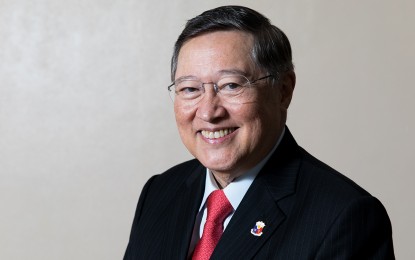
Finance Secretary Carlos Dominguez III
MANILA – Fiscal strength provides the Philippine government leeway to address the economic and health impact of the pandemic even as the size of its stimulus program is lower compared to other countries.
Department of Finance (DOF) Secretary Carlos Dominguez III, in his videotaped speech during the 29th North Luzon Area Business Conference, done through Zoom by the Philippine Chamber of Commerce and Industry (PCCI) Thursday, said the movement restrictions implemented by the government to address the rise of coronavirus disease 2019 (Covid-19) infections “was costly for our economy.”
“But despite not having the biggest stimulus package and even with the strictest lockdown, the Philippines performed better than some economies, owing to its fiscal strengths,” he said.
The government implemented an enhanced community quarantine (ECQ) in Luzon, which accounts for about 70 percent of the country’s annual output, from the middle of March to the end of April. The ECQ was extended until the end of May for the National Capital Region (NCR).
Quarantine levels in the NCR have been eased to general community quarantine (GCQ) but the area was placed back under a 15-day modified enhanced community quarantine (MECQ) from August 4 to 18 to address the request of the medical community to arrest the rise of infections.
The ECQ hampered people’s movement and only selected industries like those in the medical field and the delivery of basic goods were allowed to go out.
Subsidies have been extended to affected sectors like the poorest of the poor and workers in the micro, small, and medium enterprises (MSMEs), which account for about 60 percent of employment.
The Department of Budget and Management (DBM) earlier said it has released about PHP375 billion for the government’s Covid-19 response.
Dominguez said the Philippines’ stimulus package accounts for about 4.2 to 6.4 percent of gross domestic product (GDP), lower than Malaysia’s 18.2 percent of GDP, United Kingdom’s 23.4 percent of GDP, and Sweden’s 10.8-16.6 percent of GDP.
He, however, said that economic contraction in the Philippines in the second quarter this year is lower at 16.5 percent compared to Malaysia’s 17.1 percent and UK’s 21.7 percent. Sweden’s economy contracted by 8.2 percent during the same period.
“It appears that no matter how much money countries pump into their economies, their GDP would have shrunk massively, anyway. It is not the sheer size of the stimulus package that matters now but also whether it is actually saving the productive parts of the economy,” he said, adding “this is because the problem is not a systemic contraction or a cyclical bust.”
Dominguez said “simply, necessary mobility restrictions hamper aggregate demand” and the economic contraction in the second quarter was due to the ECQ.
He thus reiterated government efforts are not solely towards addressing the health issue, but ensuring that people would be saved from hunger and other diseases and the economy would be rebuilt since unemployment and reduced income have public health consequences.
“We cannot fight a pandemic with a weak economy; nor can we restore economic vigor without solving the public health crisis. We need a healthy people and a strong economy,” he added.
Dominguez said that since the fight against Covid-19 will still drag on pending the availability of vaccines, the government needs to be judicious on the use of its fiscal and financial resources.
“There is no knock-out punch for Covid-19 and its economic fallout. We are therefore conserving our fiscal stamina for a full, 12-round fight. Our capacity to fight can and will outlast this health challenge,” he added. (PNA)
